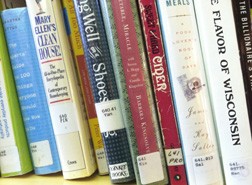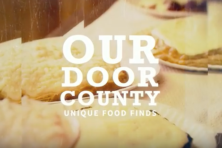Unique in the State: The Door County Library System
- Share
- Tweet
- Pin
- Share

The Door County Library System issues cards both to residents and visitors at no charge and without age or residency restrictions. Director Becca Berger attributes this unique policy to the original director Jane Livingston who was, she said, a visionary. And it all began in Wisconsin in 1948.
That year the Wisconsin Free Library Commission (WFLC) published a booklet, The Wisconsin-Wide Library Idea, proposing that library services be taken to the people, especially those living in remote areas. The concept included broadening the base of users, cooperation among libraries to reduce the disparity in service offered between wealthy and poor districts, and the introduction of a bookmobile that would literally carry the library to the people.
In 1949 the WFLC convinced the Wisconsin Legislature to fund the establishment of a demonstration district in a predominantly rural area. They did, overriding Republican Governor Oscar Rennebohn’s veto, and at the recommendation of the WFLC, chose the Door-Kewaunee district as the model.
The project was a success, and the impact on rural school children was documented through improved test scores. Unfortunately, in 1952 when a referendum asked taxpayers to financially support the project, Kewaunee County opted out, in part, according to historian Christine Pawley, because of the anti-Communist fear of subversive activity at the time, in particular the worry of libraries being used as tools for indoctrination. But Door County voters approved the referendum, and under the guidance of Livingston, the Wisconsin-Wide Library Idea became a reality that continues to the present on our peninsula.
The bookmobiles served their purpose and have disappeared into the past, but the Door County Library System is affiliated with over 50 other Northeast Wisconsin libraries in the Nicolet Federated Library System (NFLS) and the Outagamie Waupaca Library System (OWLS). A library “InfoSoup” card issued in Door County is valid at most of the NFLS/OWLS member libraries.
The fact that Door County is a tourist area leads to the library system’s uniqueness. “Part of our mission,” Berger said, “is to be welcoming.” Cards are issued to out-of-state property holders, she noted, and to date, with no liability to the system.
And because of the influx of summer tourism, unlike many other libraries, the Door County facilities are open more hours during the summer than the winter.
The “long and skinny geography” of the peninsula, she said, has resulted in a large number of branch libraries for the population.
Another unique aspect of the system, which at first might seem frivolous, is the toy lending library. Patrons may check out from the learning resource center educational toys, such as Leapfrog Pad, a computerized reader for preschoolers. The “toys” are purchased with donated money.

A patron browses through books at the Baileys Harbor Library.
Many libraries have discontinued their collections of framed art prints for loan, but Door County patrons value the service and it continues.
Funding for the system is unique, too, in that “the county pays for staffing and equipment and materials,” Berger said, “and all local municipalities pay for the library buildings,” creating a financial strength for a system that would otherwise have to support eight buildings.
Door County Libraries keep up with cutting edge technology (offering audio books on CD, cassette, Playaway and downloadable formats) in part because the system belongs to a consortium of libraries. OverDrive, for example, is an online collection that allows patrons to download electronic books to computers and other reading devices.
The Library System website is comprehensive and user friendly, and perhaps unique in that it is generated in-house. Visit it for services offered, for the calendar of upcoming events, and for useful links.
“We have the benefit of a very strong Friends of Door County Libraries,” Berger said. “Libraries our size would love to have this dedication and financial support!”
Dorothy Wickman, president of the Friends, explained that the mission of the group is to “help make our libraries great by providing resources, programs and funding for special needs.” In short, “rainy day” funds for the libraries.
A major source of funding for the Friends comes from book sales, she said, which have expanded from the annual sale at the end of July, to a holiday sale, a mid-spring sale, and Saturday sales, all of donated books.
Proceeds from the book sales pay for a number of programs, Wickman said, including paperback books for Door County Reads (this year’s book is The Heart Is a Lonely Hunter), book and author programs (Wisconsin Poet Laureate Bruce Dethlefsen will speak on October 20 this fall), winter and summer children’s reading programs, Book Pages subscriptions (offering reviews), books on CD, DVDs, and discretionary funds for each branch library.
Friends also sponsor a Walking Books Program, delivering requested materials to shut-ins.
Those of us who remember the days when the only service that libraries offered was lending books, are amazed at what is now available to patrons. Using InfoSoup, they may order books and other materials online through interlibrary loan, receive an email notice when the book is available for checkout, and then later, notice of when it is due. Questions from the reference desks may be asked and answered through email. They may use library computers to check their email, to write resumes, and to search the Internet. Those with laptops take advantage of WiFi, sometimes parking outside a library during closed hours.
Wickman received a thank-you note and donation for Friends from a woman who is a summer resident and explained that she had used library computers to plan her Door County wedding.
For more information about Door County’s role in the Wisconsin-Wide Library Idea, see Christine Pawley’s article “The Wisconsin Idea in Action” in the summer 2008 issue of the Wisconsin Magazine of History; and her book Reading Places: Literacy, Democracy, and the Public Library in Cold War America, University of Massachusetts Press, 2010. Those who wish to support Door County Libraries by joining the Friends of Door County Libraries or making contributions to the Door County Library Foundation will find information at any of the eight libraries. Visit Door County libraries online at http://www.doorcountylibrary.org.
A visit to http://www.doorcountylibrary.org is a trip to a virtual library: links to employment opportunities, book groups, genealogy aids, the catalog, book blogs computer user groups, book reviews, local school and government information, senior resources – the list goes on. Investigate for yourself!



